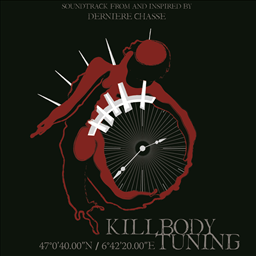
With a name like Killbody tuning and Jonathan Nido from the gloriously unhinged Coilguns on production duties, you’d be forgiven for anticipating a blizzard of guitars o’er-topped with the sound of vocal chords being ceremonially ripped out… but you would, of course, be wrong. Very wrong indeed.
In point of fact, Killbody Tuning occupy the ground between long lost indie art rockers Seafood, Mogwai, Low and sonic youth. Over the course of the album, ‘soundtrack from and inspired by Derniere Chasse’ you’ll experience a throbbing sense of unease (on opening track ‘ara ubiorum’), a desolate beauty (‘marker of change’) and a cornucopia of multifaceted moods and emotions, marking killbody Tuning out as rather a special band indeed. That the album comes housed in a rather handsome digi-pack is merely icing on an already impressive cake.
Opener ‘Ara Ubiorum’ appears amidst a steady bass hum and proceeds to advance with all the frantic pace of a Glacier, icy notes rippling out of the speakers and the percussion refusing to make even a rudimentary appearance until the fifth minute when it appears like the rumble of thunder, ominous and bass-laden. It is a slow-burning, deeply subtle and also deeply enchanting first track and although it’s possibly not best played whilst operating heavy machinery, the success of the song is that it draws you straight into an utterly different world. For those of you who recall the stark beauty and impact of Mogwai’s stunning ‘CODY’ album, then the first half of the song will cause you to reminisce over that album’s haunting, ethereal nature, whilst the briefly churning guitars that see the track out hint at a far more sinister environment entirely.
‘Seestrasse’ is hardly more energetic. The guitars gently meander looping, conjoining and subdividing and carving fractal patterns in the very air before grasping at the semblance of a rapidly disappearing tune that seems barely strong enough to sustain a band. And yet, as the guitars and percussion add colour and shade, the bass ever-present, its warm rich tones the essential backbone, the song takes life and breathes again, the music a growing presence that washes over the listener like the warm waters of a moonlit lake, with echoing guitar slowly rolling ashore in short bursts of effervescent foam that slowly grow to full-blown waves as the distortion appears and the water starts to swirl and eddy with hitherto unnoticed currents and tides.
Vocals appear on the heart-breaking ‘marker of change’ (courtesy of the talented Valerie Leimgruber’) which has echoes hints of Low, Arab Strap and latter-day Ulver shot through its sedate tones, whilst Valerie’s understated and perfectly rendered vocal performance rends the darkness of the previous track asunder and breathes a fresh life into the music as if the storm clouds so ominous in their appearance have been swirled away by a light breeze. If ‘marker of change’ suggested a fresh breeze, clearing the skies of ominous signs, ‘Porta capena’, with its tribal beat, is the hypnotic, lysergic aftermath of an all-night binge, the body returning to its normal state and reality fading to grey with the realisation that normality is far less colourful than the alternative. With guitars gently reaching a crescendo, it’s a familiar post-rock formulae that is applied with great skill and suitable variation and the result is an album that never bores or outstays its welcome, but instead invites you on a musical journey that will stimulate the emotions in a manner of which few other bands are capable.
‘Bamberg’ is a darker piece, opening with echoing percussion (perfectly captured by the pristine production job) before giving way to slices of heavily distorted guitar and all underpinned by the pulsing bass, although the heavier approach soon gives way to a more sinister quiet, shot through with minor notes and a lingering sense of doubt. ‘Mountain home [E/5/1]’ shows that the darkness can’t last, or at least not in so violent a form, and the music here summons to mind the epic discomfort of Twin Peaks with the notes all treated with backwards reverb and the pace limited to a slow trudge towards the final destination, each step forcing the muscles to burn and cramp with increasing levels of discomfort. The final track sees vocals reintroduced (this time courtesy of Celine Bart) and as before it is clear that Killbody tuning are careful indeed in their choice of vocalists, both bringing a unique and special flavour to the album, in Celine’s case, it is a slightly duskier, more soulful touch than Valerie’s and she closes the album in fine style, the music swelling behind her into a full-blown tsunami of distorted, chiming guitars and measured percussion.
With this rather stunning entry, Killbody tuning have added yet another twist to the post-rock genre. The music certainly will not find favour with everyone – for those looking for an instant hit of adrenalin, it is best to look elsewhere, but for those who admire subtlety and complexity of mood Killbody Tuning have made the perfect soundtrack to the gathering gloom of dusk and the eventual twinkle of stars as night covers the land. Beautiful, occasionally sinister, sometimes even euphoric, this is an album that will take time to be fully absorbed, but the effort on your part is repaid tenfold by the band as the true extent of the musical wonders they have created unfold in front of you. A wonderful record to behold, Killbody tuning have excelled themselves.



